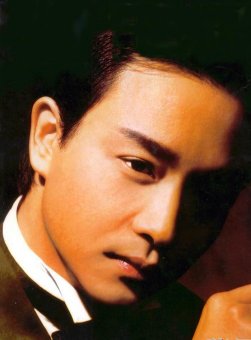
Leslie Cheung Kwok-wing (Chinese: 張國榮, 12 September 1956 – 1 April 2003) was a popular Hong Kong-Canadian singer and actor.
He entered the Hong Kong entertainment industry in 1977 and broke through with the hit song "Monica", which granted him teen heartthrob status in the '80s. During his heyday, he was known for his rivalry with fellow entertainer Alan Tam![]() , cooked up by the Hong Kong tabloid media, which resulted in fighting between their fans. Despite this, the two remained friends in private.
, cooked up by the Hong Kong tabloid media, which resulted in fighting between their fans. Despite this, the two remained friends in private.
He announced his retirement from the pop music industry in 1989 and completed a 33-show farewell tournote thereafter. In 1990, he left Hong Kong and emigrated to Vancouver. He continued his music career as a composer into the '90s, composing more than ten songs during that time. In 1993, he won Best Original Movie Song Award from the Golden Horse Film Festival for the theme song "Red Cheek, White Hair" to the movie The Bride With White Hair. He returned to the industry in 1995 with a post-"retirement" album, Beloved.
Cheung is also known for his acting career. He starred in several Wong Kar-wai films such as Happy Together and Days of Being Wild, the latter of which won him the Best Actor Award at the Hong Kong Film Awards in 1991 and his first nomination of Best Actor at the Golden Horse Film Festival (Taiwan). In 1992, his performance as the Beijing opera star Dieyi Cheng in the historical film Farewell My Concubine won him critical acclaim and international fame. Farewell My Concubine is the first Chinese film to have won the Golden Palm award at the Cannes Film Festival.
Because of his international popularity both as an actor and singer, Leslie Cheung also contributed to the rise of Cantonese music in other parts of East Asia. He is the first Chinese artist to dominate the music charts in Korea and set a record of foreign artists of holding 16 concerts in Japan.
Cheung committed suicide on April 1, 2003. His death was greatly mourned; Maggie Cheung penned a heart-felt eulogy, which was published in Cahiers du Cinéma.
His films:
- Erotic Dreams of the Red Chamber (1978)
- Teenage Dreamers (1982)
- Energetic 21 (1982)
- Nomad (1982)
- The Drummer (1983)
- First Time (1983)
- Little Dragon Maiden (1983)
- Behind the Yellow Line (1984)
- Merry Christmas (1984)[cameo]
- The Intellectual Trio (1985)
- Crazy Romance (1985)
- For Your Heart Only (1985)
- Last Song in Paris (1986)
- A Better Tomorrow (1986)
- A Chinese Ghost Story (1987)
- A Better Tomorrow II (1987)
- Rouge (1988)
- Fatal Love (1988)
- Aces Go Places 5 (1989)
- A Chinese Ghost Story 2 (1990)
- Days of Being Wild (1990)
- The Banquet (1991)[cameo]
- Once a Thief (1991)
- All’s Well Ends Well (1992)
- Arrest the Restless (1992)
- The Bride With White Hair (1993)
- The Bride with White Hair 2 (1993)
- All's Well Ends Well, Too (1993)
- The Eagle Shooting Heroes (1993)
- Farewell My Concubine (1993)
- It's a Wonderful Life (1994)
- He's a Woman, She's a Man (1994)
- Long and Winding Road (1994)
- Over the Rainbow Under the Skirt (1994)[cameo]
- Ashes of Time (1994)
- The Chinese Feast (1995)
- The Phantom Lover (1995)
- Tri-Star (1996)
- Temptress Moon (1996)
- Shanghai Grand (1996)
- Who's the Woman, Who's the Man (1996)
- Viva Erotica! (1996)
- All's Well, End's Well '97 (1997) [cameo]
- Happy Together (1997)
- Ninth Happiness (1998)
- Anna Magdalena (1998) [cameo]
- Moonlight Express (1999)
- A Time to Remember (1999)
- The Kid (1999)
- Double Tap (2000)
- Okinawa Rendezvous (2000)
- Inner Senses (2002)
Tropes associated with Leslie Cheung:
- All Girls Want Bad Boys: His character in Days of Being Wild (and many other roles he's portrayed), earned him the nickname 'The James Dean of Hong Kong'.
- Gender-Blender Name: He was born Cheung Fat-chung (張發宗) and took the English name "Leslie" after seeing Leslie Howard in Gone with the Wind, saying he was drawn to its androgyny.
- Pretty Boy: Cheung was very fine-featured, which netted him Teen Idol status. They were put to good use playing the feminine Dieyi in Farewell My Concubine.
- Queer Character, Queer Actor: Cheung was openly bisexual, and played MLM characters in Farewell My Concubine and Happy Together.
- Shirtless Scene: In many of his movies including Moonlight Express and Happy Together.
